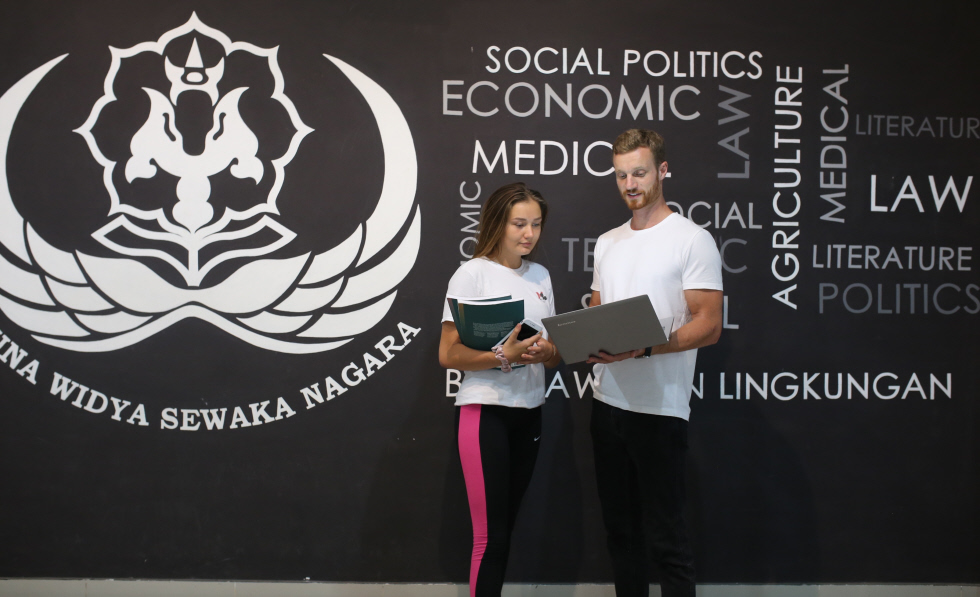Since 2007 Asia Exchange facilitates for northern Europeans to study at quality universities in many of Asia’s most attractive places. Likewise, since 2017 Asians can also get help to study in Finland and select European nations. Learn all about how this idea came about, based on a typical start-up problem scenario, and grew into a much sought after student mobility success.

Bali, Bangkok, Phuket etc. are attractive far-away places for young adults in the Nordics when it comes to both travel and studies. But getting to study there was no mean feat – up until Asia Exhange came on board that is…
Asia Exchange helps individuals to realise their dream of studying abroad in some of the most amazing destinations on earth, easily and affordably, as the provider states.
“It’s like an once-in-a-lifetime experience for anyone who really wants to experience something totally new. Maybe they want to go as far away as possible; to be in one of those world-famous places. And that is why we are also very selective in terms of our destinations. For example Seoul in Korea is one of the fastest growing places for us,” says co-founder/Global Education Leader Tuomas Kauppinen, who currently live in Hong Kong with his family.
International from the outset, this Finnish start-up that facilitates more international studies was actually born as idea in China, and subsequently helped to scale its business mainly via the German market.
Difficult to apply to Asia
But the story begins with Tuomas’ own experience regarding university studies in Asia. Tuomas had studied in the US, when he in 2005 came to Asia on a trip to Kuala Lumpur and Singapore to visit a friend. Later the same year he also made and excursion to Bangkok, and made the decision to seek to study there. But, as it turned out, his home university in Oulu had no student exchange programme – which left him very disappointed.
“But my good friend Harri Suominen who is the Managing Director and co-founder of Asia Exchange and Edunation, had had a good experience studying at Shanghai University in 2005. I was able to enroll there at pretty affordable price. I applied as a free-mover and studied in 2006, and really liked the experience,” says the Finn.
Before going back to Finland Tuomas took a holiday trip to Hainan, Guangzhou and Hong Kong, but by now he had this nagging thought about the difficulty as a Finnish student to apply to Asia, while there was at the same time a very high demand.

“A lot of young Finnish people had started travelling to Asia, and of course the student mobility was increasing while it was at the same time so challenging; there were not many connections at my university. I felt I needed to do something about that, so I started contacting some universities in Guangzhou about facilitating some study programmes for Finnish students.” He was too shy to ask his university in Shanghai though, having just studied there himself.
But in Guangzhou one university replied and invited him to have a meeting. ‘Please bring any information about your company,’ they had asked him. “And I had nothing; just a new tailor-made suite and some name cards, with no company existing. I printed one A4 page to bring with me, with the flags of Finland and China and some text about the idea. And things went well in that they were very happy about the idea. So that is how things started.”
“I also looked into other Finnish universities and realised that also those didn’t have much in terms of Asia connections. Of course there were some university connections to China, but not much in Beijing Hong Kong or Shanghai, and definitely nothing enabling studies to study in Bangkok, Phuket or Bali; there were only to some destinations that I didn’t recognise. So I realised that there was potential, recalls Tuomas.
Today things are different though, with many more bilateral university agreements and facilitators of studies abroad. And yet, there are similar demands.
“It has been changing a lot in the sense that now Finnish universities are more international than back then. Many of them even have destinations in Bangkok or Shanghai, for example, or other well-known cities in Asia. They have been able to sign more bilateral agreements etc. But not many have something in Bangkok or Bali yet..There can be also a situation where there’s a university in Finland and one in Bangkok, but the agreement only allows 1-2 students per year, while there are a number of additional students with a market need.”
The backbone and the essence of student mobility is that two universities in different countries enter into a bilateral agreement to exchange students and sometimes also lecturers.
“However, the student mobility is not always in a balance. For example some students in Thailand might not have enough funds to go to a European country for example. Or they are not so interested in going there. Then, on the other hand, from the Nordic countries–that are very international–a lot of young people really like to travel, learn different languages and study abroad. That is why oftentimes there are more students from the Nordic countries interested in studying in Asian countries than vice versa, especially concerning shorter student mobility, one semester or so. Asia Exchange must be able to fulfill that demand. And we can provide unlimited placements for the Nordic students to study in Asia without the pressure of sending Asian students to study in the Nordic countries.”

Expanding beyond Finland
To get going, Tuomas suggested to Harri, who was also interested, that they ought to start contacting Finnish universities. And that is when their excitement grew – as it turned out that those were very positive.
“And soon we started contacting universities in Bangkok and Phuket. And they responded to us. So in early 2007 we took some time off from our respective jobs and visited Shanghai and Ghuangzhou, followed by Bangkok and Phuket, to meet with the universities. It all went fine and we realised that this might actually work with the universities on both sides being happy about the idea.”
Harri and Tuomas also thought of the expansion potential early on, and were helped in particular by the German market.
“It was very essential in the beginning that we understood that Finland was very small so we needed to go overseas very quickly, in order to scale the company. We went to Stockholm to pitch the idea to some universities but that didn’t start flying very fast, though it was a good trip and we signed a partnership with Kilroy Education. Instead it was Germany that quickly became the biggest market for us. It has a larger population obviously, but also with even less of these possibilities than we in Finland or in Sweden have. There’s a great demand from a lot of German students who’d like to study abroad but who lack options in Asia; especially in known destinations,” explains Tuomas.
“Then our team started growing and we finally had enough money and time to invest more in our internationalisation. Also the Finnish government started supporting us, and Sweden is now an even bigger market than Finland for us. What makes Sweden very different from say Germany or Finland, where most of the students are enrolled at universities, is the many gap year students. Many high school graduates who are unsure about what to do next want to come to Asia for one semester through us and have that special experience.”
“Denmark is also growing. Copenhagen Business School students have studied in the Bali Business Foundation, where they get to learn a lot from local businesses and start-ups aside classroom teaching. We have also signed a partnership with Gateway College from Norway, being one of the biggest players in Europe in student mobility. That will help us to establish ourselves better also in Norway, where we can see great possibilities.”
“Students who want to apply through us must pay a bit for the service. They therefore also think about it carefully and really want to experience something of the best that Asia has to offer,” adds Tuomas.
One semester abroad may also end up not being extra studies outside a degree: “Actually most our students can transfer the credits, so they can complete some credits while studying abroad and transfer those to their home university degree, thus avoid delaying their graduation. They get a transcript of all records, and those credits can be transferred if he or she decides to enrol to some university later back in Scandinavia.”

Edunation promotes Finnish education and talent pool
These days the Finnish provider also differs from others in how they can offer their services for degree students via Edunation, which has a wide network of partner universities and universities of applied sciences in Finland, as well as in Europe (currently Estonia, France and Ireland).
“In Asia exchange students is often only for one semester or so. But via Edunation students come from Asian countries to Finland etc. wanting to do the whole degree and might stay for four years. But this happens without anybody asking for a similar number of Finnish students having to go somewhere. It’s more an independent decision that they really want to come – and even stay after the degree in Finland, looking for work and even permanent residency!”
Edunation, that offers a wide range of easy and accessible courses, from Pathway Diploma to full degree programs, was born when the Finnish start-up guru Peter Vesterbacka contacted the Asia Exchange founders in the year they celebrated ten. Tuomas had also been asked frequently how one can study in Finland, where it used to be very cumbersome to apply.
“Peter suggested sending Asian nationalities to Finland and we got going and set up Edunation with him as one of the founders and owners. Peter has also been a good mentor and source of inspiration since then, with Asia Exchange benefitting a lot,” says Tuomas.
Edunation’s focus has been to make the application procedures easier and more efficient for both students and universities.

“At the same time, Finland introduced tuition fees for non-European nationalities and because of that we were able to start invoicing tuition fees for Asian students, and actually free is not always the best in this part of the world. In Hong Kong, for instance, they spend more money per capita on education than anywhere else in the world. So if it’s free they don’t think the education can be good. In Sweden the made this shift earlier and it has been very successful. Finland was a lot behind and needed to make the admission process much more customer-friendly. Edunation has been able to contribute and change all that. We can now accept students within one week to Finland, on behalf of partner universities that give the final confirmation. But in some cases even within two weeks the student can have the final offer letter for the degree studies. It was also a good thing for us as a private company to be able to operate financially by charging commission from the students.”
Edunation also supports Finland’s big need for additional talent going forward. It aims to create an international talent pool while making education the biggest industry in Finland. “Due to its aging population and a huge labour shortage in specific sectors such as IT I think Finland has and will face huge challenges in the future if the country is not able to get more young people or talented international university students who can even stay there after graduation and work for our companies or establish their own start-ups or so,” believes Tuomas.
Edunation offers applicants high quality customer service throughout the application process and also supports the students with their residence permit applications and with all the practicalities that come up when moving to a new country.
Edunation is constantly promoting the world-renowned Finnish education, striving to make it the biggest export industry in Finland. Its government has shown gratitude by awarding the two Finnish education start-ups grants multiple times, including support since the arrival of Covid-19, which has significantly hindered student flows across borders.
“Especially early on, it would have been very difficult to go overseas and become international without those grants, and there are multiple programmes in Finland that helps companies to become more international.”
Covid-19 will also soon be seen as merely a mishap in history, and international students will once again be allowed in to most destinations by the start of 2021.
“And all of our partner universities offered the possibility to study online since September. In case of any delays due to immigration- and travel restrictions students could therefore study online as long as they could travel to Finland and continue the degree there later.”
“In 2021 I‘m optimistic that student mobility–being one of the megatrends as well–will keep on growing, so long term we have some great possibilities,” ends the Edunation President and CEO.


